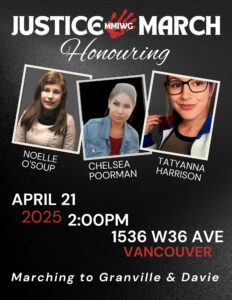Justice for Noelle, Chelsea, and Tatyanna: A March for the Lives They Were Denied
On April 21, 2025, families, advocates, and communities will gather in Vancouver to march in memory and in rage. We are marching for Noelle O’Soup, Chelsea Poorman, and Tatyanna Harrison—three Indigenous girls and young women whose disappearances and deaths were not only preventable but foreseeable, rooted in colonial systems that continue to treat Indigenous lives as disposable.
The Justice for Noelle, Chelsea, and Tatyanna March begins at 2:00 PM at 1536 West 36th Avenue—the Shaughnessy mansion where Chelsea’s body was found—and proceeds to Granville and Davie Streets. The march is an urgent public demand: for justice, for answers, and for the transformation of the systems that failed them.
The March is occurring during Prevention of Violence Against Women Week 2025 – a week dedicated to highlighting ways to end violence against women and gender-based violence.
They Should Still Be With Us
Noelle O’Soup (14 years old)
Noelle was a 14-year-old Nēhiyaw girl who went missing from a Port Coquitlam group home in May 2021. Over a year later, her body was found in a locked room of a single-room occupancy (SRO) building in Vancouver’s Downtown Eastside—alongside another deceased woman and a third person found alive. The apartment was rented by Anh-Tuan Pham, a man with a lengthy criminal history, including weapons and drug charges, and who was wanted on a Canada-wide warrant at the time.
The Vancouver Police Department (VPD) was aware of Pham’s criminal record and had received multiple complaints about his suite. Yet no action was taken until after his death. As Global News reported, a VPD officer was under investigation for neglect of duty in Noelle’s case. And as CBC revealed, Pham was known to offer drugs to young girls, and his unit had been flagged repeatedly—but there was no coordinated response, no intervention, and no urgency.
Why did VPD not act sooner to enter that suite?
Why wasn’t Noelle found earlier—when she might have still been alive?
Why was a child under state care living and dying in such horrific conditions?
The Ministry of Children and Family Development (MCFD), responsible for Noelle’s care, has offered no accountability. How many more Indigenous children must die before this ministry is overhauled?
And where are the consequences for those who were supposed to protect her?
Chelsea Poorman (24 years old)
Chelsea, a 24-year-old Cree woman from Kawacatoose First Nation, went missing in September 2020. Her body was found in April 2022, in the backyard of a mansion in Vancouver’s wealthy Shaughnessy neighbourhood—just steps away from the starting point of this march. Her body was so decomposed that police could not determine a cause of death. They declared the case not suspicious and closed it within days, to the shock of her family and community.
A 2023 CBC investigation revealed that the VPD did not canvas neighbours, did not identify or interview the property owner until a year after her body was discovered, and did not search the home until prompted by media inquiries. Key evidence was overlooked or ignored. Chelsea’s sister described her as a vulnerable person, still healing from a traumatic brain injury. But she was treated as just another missing person—not as a young Indigenous woman at elevated risk.
Why did police conclude so quickly that there was no foul play—despite her remains being incomplete and the home being unoccupied?
Why was her death deprioritized?
How many other cases have been dismissed this way?
This is a textbook example of what Indigenous families have long described: a justice system that neither investigates nor protects our people with the seriousness and dignity we deserve.
Tatyanna Harrison (20 years old)
Tatyanna was a Métis woman who had been reaching out for help in the weeks before her disappearance in April 2022. Her body was found in a Richmond boatyard in May—but it took authorities more than a month to identify her, even though her mother had been actively searching. It was only after public pressure that the VPD acknowledged the delays and mishandling of her case.
She had sought help from hospitals, housing providers, and crisis services, but like so many Indigenous girls and women, she was treated as a problem to be managed—not a person to be protected. Her death, like Noelle’s and Chelsea’s, is not isolated—it is systemic.
Most MMIWG Are Not Women—They Are Girls in State Care
It is essential to understand that many of those who make up the crisis of Missing and Murdered Indigenous Women and Girls are not adults—they are teenagers and children, often in the care of provincial ministries like MCFD. These girls are vulnerable not by accident but by design. The so-called “child welfare system” is a pipeline to homelessness, exploitation, overdose, and death.
Why is there no public inquiry into the role of MCFD in the deaths of Indigenous girls like Noelle?
Where is the accountability for social workers, group home operators, and ministry officials who disappear behind bureaucratic silence?
A March That Demands More Than Grief
This march is more than an act of mourning—it is a movement for justice. It demands:
- Transparent investigations into the deaths of Noelle, Chelsea, and Tatyanna
- Accountability for police, social workers, and ministry staff who failed them
- Immediate transformation of child protection and policing in BC
Join the March: April 21, 2025
📍 Start: 2:00 PM at 1536 West 36th Avenue
📍 End: Granville and Davie Streets
Bring your signs, your voices, your drums, and your love for our stolen sisters.
We march because they mattered.
We march because they were failed.
We march because this must never happen again.





